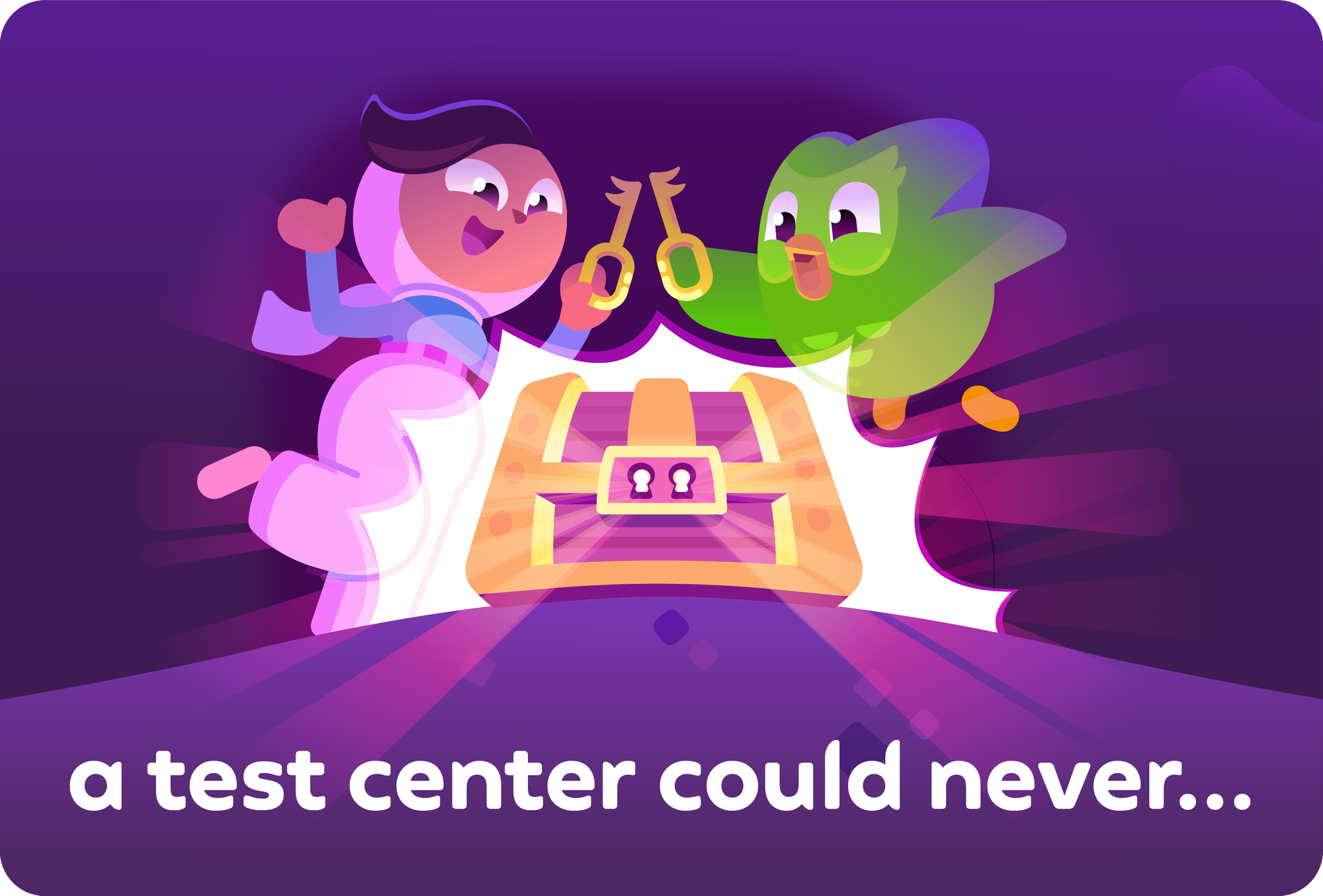Traditional test centers rely on human proctors to monitor test takers, but in reality, cheating often goes undetected. A single proctor is responsible for supervising an entire room, meaning subtle forms of misconduct can slip through the cracks—and in some cases, proctors themselves have been involved in cheating schemes.
The Duolingo English Test (DET) takes a different approach. AI-powered analysis, keystroke monitoring, and human review work together to detect cheating methods that would be impossible to catch in a test center. And for honest test takers? These security measures operate seamlessly in the background, ensuring that every certified score is valid, fair, and earned.
Why test centers fail at detecting cheating
Even with proctors walking around the room, many forms of cheating go unnoticed in test centers. Some of the most common undetectable (or ignored) tactics include:
- Copying answers discreetly—test takers can glance at a neighbor’s work or use small notes hidden under their sleeves or desks.
- Memorized responses—some test takers prepare scripted answers in advance, even if they don’t understand the material.
- Coached answers—test takers may use code words or hand signals to receive help from a friend in the room.
- Proctor misconduct—in extreme cases, test center staff have been caught helping test takers cheat in exchange for money, allowing rule-breaking to go unchecked.
Because test center proctors must monitor multiple people at once, they can easily miss small cues, subtle gestures, or quiet interactions. And when misconduct does happen, there’s often no recorded proof to review later.
That’s why the DET does things differently—ensuring cheating is caught, no matter how subtle.
How the DET catches what test centers miss
Unlike traditional exams, the DET is fully recorded and analyzed using advanced technology to flag even the most discreet forms of misconduct. Here’s how:
AI-powered keystroke monitoring detects unnatural typing
One of the biggest security challenges in language testing is detecting when a test taker isn’t using their own words. The DET’s AI tracks how responses are typed to flag suspicious behavior, such as:
- Copy-typing from an external source—If someone is transcribing text rather than thinking and writing naturally, AI can detect unusual typing rhythms and speed changes.
- Abrupt shifts in writing style—If part of an essay is written fluently but another part has unusual errors, it could indicate partial AI assistance or memorized content.
- Pausing in unnatural places—Frequent pauses at odd moments could suggest that a test taker is referring to external notes.
Unlike human proctors, who only see the final written response, the DET tracks how that response was written—making it much harder to cheat undetected.
AI identifies suspicious behavior across thousands of test sessions
At a test center, a proctor is only responsible for what they see in real time. But on the DET, AI can analyze thousands of test sessions simultaneously, looking for patterns of misconduct that might not be obvious in a single session.
For example, AI can detect patterns of repeated responses—if multiple test takers from the same region submit identical or near-identical answers, it may indicate that test takers are using shared resources to cheat. It can also detect similarities in unusual responses, so that if a test taker’s writing closely matches AI-generated text or leaked templates, it gets flagged for review.
By looking at data from across the entire testing system, DET security measures go beyond what a single test center proctor could ever catch.
Human proctors and AI work together for precise enforcement
While AI can flag unusual behavior, human proctors carefully review cases to ensure accurate and fair enforcement.
First, AI flags suspicious test sessions—but decisions aren’t automated. Instead, trained proctors carefully review flagged cases to determine whether a rule was broken. And unlike test centers, where a proctor’s decision is final, every DET session is fully recorded, allowing for post-test review so that test takers are treated fairly. Because DET proctors review sessions anonymously and asynchronously, they cannot be bribed or pressured, unlike some test center staff.
This hybrid approach ensures test security without false accusations, protecting both test takers and the integrity of their scores.
A more secure, fair testing experience
The DET doesn’t match test center security—it surpasses it, ensuring that every score is verified and fair. By leveraging:
✔️ AI-powered keystroke tracking to detect unnatural typing patterns
✔️ Data-driven analysis to flag patterns of misconduct across thousands of tests
✔️ Full test session recording to allow for post-test review
✔️ Anonymous proctors who cannot be influenced or bribed
…the DET catches cheating methods that would be undetectable in a test center.
These security measures operate seamlessly in the background, ensuring that test takers’ hard work is recognized with a certified, secure score that institutions can trust. Because we believe that every test taker deserves a fair playing field.
